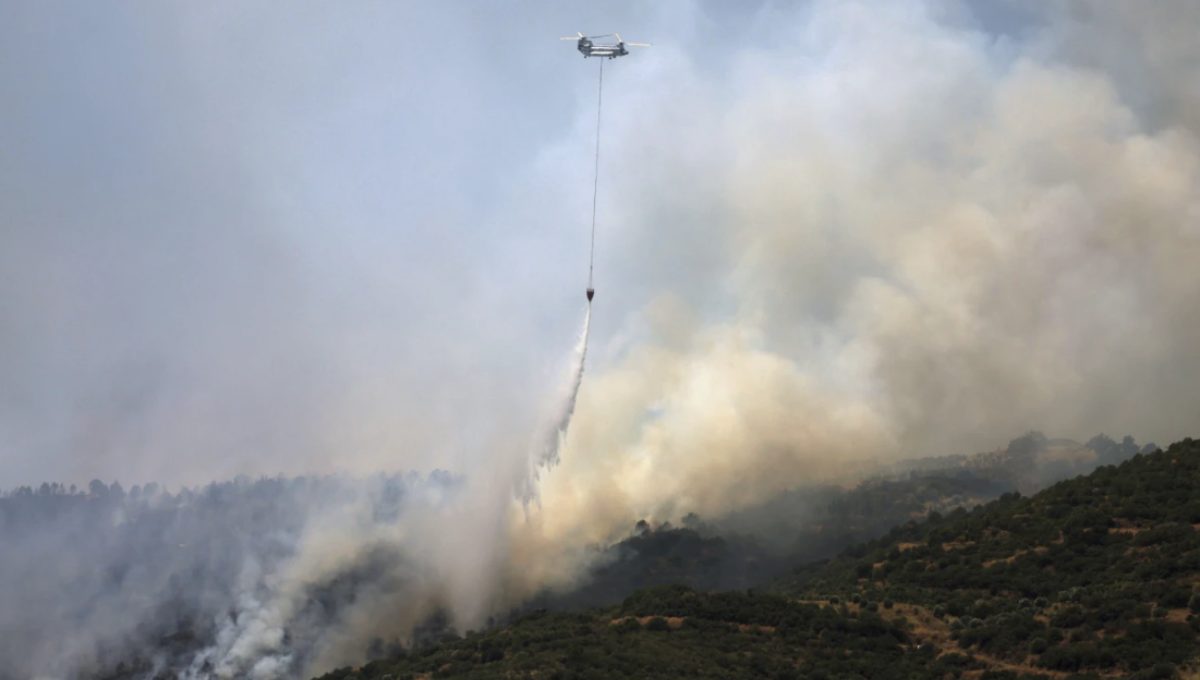A new wildfire broke out in coastal areas south of Athens on Friday, prompting emergency evacuations as Greece continued to grapple with a series of blazes during the peak of summer. Meanwhile, neighboring Turkey is facing a severe wildfire crisis of its own, with multiple fires raging across its western regions.
In Turkey’s Aegean province of İzmir, wildfires erupted in at least five locations, fueled by scorching temperatures, strong winds, and low humidity. The fires have already claimed two lives, destroyed around 200 homes, and forced tens of thousands to evacuate.
Forestry Minister İbrahim Yumaklı confirmed that efforts to contain a deadly fire near the town of Ödemiş continued for the third consecutive day. A forestry worker died Thursday while trying to control the flames, and an 81-year-old resident succumbed to smoke inhalation. Emergency teams are also battling a fresh blaze near the Buca district, which started late Thursday.
“Our intense air and land fight to control the fires in Ödemiş and Buca continues,” Yumaklı said on social media.
Another major fire near the coastal town of Çeşme, a popular tourist destination, was brought under control by Friday. That fire led to the evacuation of three neighborhoods and the temporary closure of key roads.
Further to the south, new fires erupted near Turkey’s border province of Hatay. Flames rapidly spread near residential zones due to high winds, while across the border in Syria, wildfires swept through mountainous terrain in Latakia province. Syrian Civil Defense teams reported difficulties containing the fires due to extreme heat, strong winds, and dangerous terrain, including the possible presence of unexploded ordnance from previous conflicts.
In Greece, emergency services deployed eight helicopters and eight water-dropping planes to combat a fire in Koropi, about 35 kilometers (22 miles) south of Athens. This came just after previous fires outside Athens and on the island of Crete, where more than 5,000 people—including residents, hotel staff, and tourists—were evacuated from coastal areas.
Hundreds of firefighters remain stationed in Crete to prevent flare-ups, particularly due to unpredictable winds. Local authorities estimate that the fire on the island has consumed about 15 square kilometers (roughly 3,700 acres) of land.
In Syria, Civil Defense spokesperson Abdulkafi Kayal reported that fires have spread as far as 20 kilometers (12.4 miles), blocking access roads and complicating evacuation and firefighting efforts. He urged residents in high-risk wooded areas to evacuate temporarily until the fires are under control.
Turkish officials have yet to release an estimate of the total area affected by the blazes. However, preliminary investigations suggest that most fires in İzmir were triggered by malfunctions in power lines. The fire in Buca was reportedly caused by construction work, where sparks from a metal grinder ignited dry vegetation.
Both Greece and Turkey are accustomed to summer wildfires, but experts warn that climate change is exacerbating the frequency and severity of such events, making them harder to predict and control.
Also Read:
Wildfire Forces Evacuations of Hotels and Homes on Greece’s Crete Island
Greece Mobilizes Largest Firefighting Force and Expands Drone Fleet for Wildfire Season













